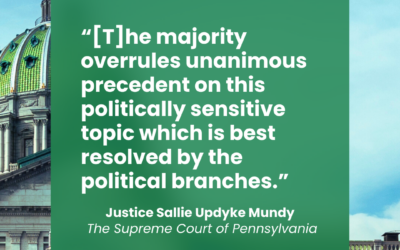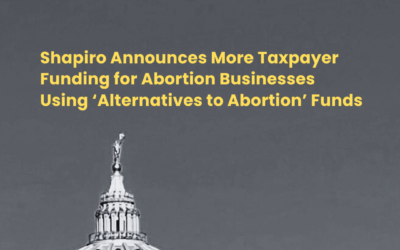Key Points:
-
A consortium of abortion clinics have sued Pennsylvania, arguing that the Pennsylvania Supreme Court should force taxpayers to fund abortion and to find (invent) a right to abortion in the Pennsylvania Constitution.
-
A win for the abortion industry in this case would force taxpayer funding of abortion, and would likely establish a right to an abortion in Pennsylvania’s Constitution.
-
If abortion is declared a constitutional right in Pennsylvania, all current and future pro-life regulations would be in jeopardy of being struck down
The Threat
The Pennsylvania Constitution contains no right to an abortion or to taxpayer funded abortions, but the abortion industry is asking the Pennsylvania Supreme Court to find (invent) one in a case they filed, Allegheny Reproductive Health Center v. Pennsylvania Department of Human Services.
The case, brought by a consortium of abortion clinics (including Planned Parenthood) argues that the court should declare a right to abortion and taxpayer-funded abortions in the Pennsylvania Constitution.
A win for the abortion industry in this case would not only force taxpayers to fund abortion, but a court-imposed state-constitutional “right to abortion” could lead to all of Pennsylvania’s current pro-life laws being struck down,and could result in legalizing abortion right up until birth, paid for with taxpayer dollars. Any future pro-life laws enacted to protect women’s health and preborn babies lives would likely be struck down under such a ruling. Current pro-life regulations in the Abortion Control Act, such as the 24-hour waiting period requirements, informed consent, and 24 week abortion limit would be in jeopardy of being repealed and ruled unconstitutional. The same is true with abortion clinic regulations put into place to protect women, passed into our law after the Kermit Gosnell “House of Horrors” scandal.
In addition to the lawsuit, the Abortion Industry is also trying the legislative route. House Bill 1957 would also create a constitutional amendment to enshrine abortion in Pennsylvania’s constitution and remove our current pro-life protections.
The Lawsuit Status:
The Commonwealth Court ruled against the abortion industry in the Allegheny Reproductive v. Pennsylvania case on March 26, 2021. But the abortion industry appealed to the PA Supreme Court. The Pennsylvania Supreme Court ruled that there is no “fundamental right” to abortion, but three justices (Christine Donohue, Kevin Dougherty, and David Wecht) overruled longstanding precedent that prohibited taxpayer funding of elective abortions. Justices Donohue and Wecht expressed interest in recognizing a right to abortion, while Justices Sally Mundy and Debra Todd dissented, with Mundy arguing the issue should be resolved by the political branches, not the courts. Justice Kevin Brobson abstained, and there was a vacancy on the court. The case was remanded to the Commonwealth Court, which heard oral arguments in February 2025. Governor Josh Shapiro’s administration had announced early on that they would not defend the law but would advocate for striking down the Medicaid funding ban.
Conclusion:
If the Abortion Industry gets their way, the PA Supreme Court ruling would force state taxpayer funding of abortions, strike down parental consent and 24 hour waiting period requirements, end health and safety regulations to protect women at abortion clinics, and worse. And any future legislation to protect women and babies would be found unconstitutional. Pennsylvania would join a list of states where lawsuits have already resulted in those state supreme courts “finding” a right to abortion in their constitutions, thereby striking down pro-life laws just like ours.

Related Articles
PA House Passes Bill To Remove ‘One Man, One Woman’ Marriage Definition From State Law
This symbolic bill would replace the state’s current husband/wife definition with any “two individuals,” ignoring the primary reason why the government is involved with marriage. (HARRISBURG, PA - July 2, 2024) Today, in an expression that places the desires of...
Planned Parenthood to close another abortion center in PA where 800+ abortions happen every year.
In the last 15 years, Planned Parenthood has closed nearly 50% of all their locations in Pennsylvania. Planned Parenthood announced this week that they will be shutting down another abortion facility in Pennsylvania, making it 17 facilities that have shut down in PA...
New Organization Unites Pregnancy Medical Clinics and Resource Centers in PA to Help Achieve Optimal Maternal and Child Health
Pennsylvania Pregnancy Wellness Collaborative (PPWC) is a unifying voice for pregnancy resource centers in Pennsylvania https://youtu.be/aJktcU_SySc (HARRISBURG, PA - March 19, 2024) Today, directors of pregnancy medical clinics and resource centers in PA...
Is This the Medical Scandal of the Century?
Three Things To Know: Detrans Awareness Day (March 12) By: Dan Bartkowiak Is this the medical scandal of the century? March 12 is Detrans Awareness Day - so this is a prime time to discuss the cracks beginning to show in the “gender affirmation care” industry. The...
Thoughts on IVF from an IVF baby
I am deeply concerned about IVF. 96% of biologists (the vast majority of those who were polled are nonreligious and Democrat) agree that life begins from the moment of conception. At this point, it is settled science.
Planned Parenthood to Democrat allies: “We couldn’t do this without you”
On Tuesday we mentioned a roundtable last week that Planned Parenthood had with several Democrat lawmakers, as well as Governor Shapiro. The roundtable featured Planned Parenthood’s national president, Alexis McGill Johnson, as well as each regional leader in...
Court Case Continues in Abortion Industry’s Push For Taxpayer Funding of Abortion
No “fundamental right” to abortion found by majority, yet three PA Supreme Court Justices overrule long-standing precedent prohibiting taxpayer funding of elective abortions; Two Justices dissented (Mundy and Todd), showing support for that precedent. (HARRISBURG, PA...
Shapiro Announces More Taxpayer Funding for Abortion Businesses Using ‘Alternatives to Abortion’ Funds
Having canceled the contract with Real Alternatives, Gov. Shapiro now sends “alternatives to abortion” designated funding to organizations that promote and fund abortion facilities. (HARRISBURG, PA - January 24, 2024) Gov. Josh Shapiro’s unilateral decision to...








